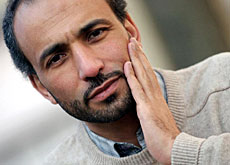
Mirror, mirror on the terrorist list wall,
Whose the most likely terrorist of them all?
In the post 9/11 world it is not easy to have a Muslim name. Just because your name is Khan, does not mean you are a terrorist. Just because your university (Harvard, for example) has a fellowship paid for by the Bin Laden family does not mean it is an academic haven for suicide bombers. But if you have a last name of Ramadan, you are not going to be put in the fast lane for an entry visa. Literally. In 2004 the distinguished Islamic scholar Tariq Ramadan was appointed to a tenured professorship at the University of Notre Dame. One would think having a major contemporary voice for Islam, especially Muslims living in secular societies, at an acclaimed Catholic university would help break down or at least counter the hatred that fueled the Twin Towers bombers. Such thinking was not on the agenda of the Bush administration, which was more attuned to the slimy interrogation technique of water boarding than interfaith dialogue.
Ramadan, a Swiss citizen, was denied a visa, so claimed the State Department, because he had given money to a charity that the State Department alleged funneled funds to Hamas. Ramadan said he had no knowledge of this; it was after all a registered charity; it was not as though he wrote a check for “cash” and sent it to Waziristan c/o anyone named Osama. Apart from a flimsy rationale, the public relations bomb thrown at Muslims around the world probably added recruits to the anti-Western groups that Ramadan has consistently argued against. The justification for not allowing Prof. Ramadan into the United States resulted in his invitation last November to Montreal, where the American Academy of Religion (not exactly a hotbed of terrorist rhetoric) could finally hear his views.
Miracles, or what seem like miracles given the silly decisions of the past, do happen. Yes they can. The State Department in January lifted the ban on Professor Ramadan and he will make his first trip since the 2004 denial and speak on April 8 at Cooper Union. This is a panel entitled “Secularism, Islam and Democracy: Muslims in Europe and the West,†sponsored by the American Association of University Professors, the American Civil Liberties Union, PEN American Center and Slate. The panel will include the journalist Ian Buruma, Dalia Mogahed, director of the Gallup Center for Muslim Studies, and Joan Wallach Scott, a professor of social science at the Institute for Advanced Study. Americans will finally be able to hear live this professor from Oxford University and author of some 20 books.
No doubt Campus Watch is watching closely. In 2004 their watchful eyes reprinted a negative character attack by Fouad Ajami, who I suspect most Arabs view the way that most African Americans view Clarence Thomas. Here is what Ajami spun:
The genealogy of Tariq Ramadan was fundamental to his ascendancy to power and prominence: Nasab (acquired merit through one’s ancestors) is one of the pillars of Arab-Islamic society. (It is fast becoming so in two endeavors of American life, politics and Hollywood, but that is another tale.) Cunning in his use of his grandfather’s legacy, Mr. Ramadan could embrace his grandfather while maintaining, when needed, that the sins of ancestors cannot be visited on descendents. But he would never walk away from his legacy, and pride in his grandfather suffuses his work. In a piece of writing in November 2000, the reverence for Banna was astounding. No, he would not, he said, disown his descent from a man who “resisted British and Zionist colonialisms, who founded 2,000 schools, 500 social centers, and as many developmental cooperatives,” and who never ordered or sanctioned terrorist attacks.
Forget the possible rerouting of money to an organization democratically elected to represent a people under external political control. For Ajami it is enough that Tariq Ramadan is the grandson of Hasan al-Banna, the Egyptian who helped found the Muslim Brotherhood. For Ajami this must be an academic mark of Cain, because Tariq Ramadan draws attention to the fact that the Muslim Brotherhood was as much a social institution with legitimate grievances against British rule as a thorn in the political side of Egypt’s more recent history. I checked the bland Wikipedia entry on Professor Ajami, but could not find any information on his grandfather. Let’s say, hypothetically, that his grandfather (either one) was a crook, a bandit who robbed and raped and tortured people. Should such a revelation be found out by an anti-Campus Watch clone, should we then ask the MacArthur Foundation to take back the genius award they bestowed on Ajami in the 1980s?
There is, perhaps, a reason why the Justice Department, for all the good that usually comes out in the end, is metaphorically represented by a blindfolded woman with exposed breasts. Justice should be blind to certain things, but in this case from the Bush administration it was the beam in their polemically prejudicial eyes that allowed them to imagine the splinter in the eyes of the man requesting a visa. I suppose Karl Rove would courageously argue that by keeping out Tariq Ramadan, America was kept safe. It is refreshing to suppose that such a hawkish advisor might find the pen mightier than the sword or cruise missile. Imagine, if a Muslim was allowed to engage in dialogue with students and professor at a major Catholic university and they all actually worked together to create peace rather than pour salt on the old and existing wounds?
Tickets: $15/$10 for PEN/ACLU Members and students with valid ID. Tickets
available through www.smarttix.com
or (212) 868-4444. They may also be purchased at the door. Seating is by
general admission, on a first-come, first-served basis.